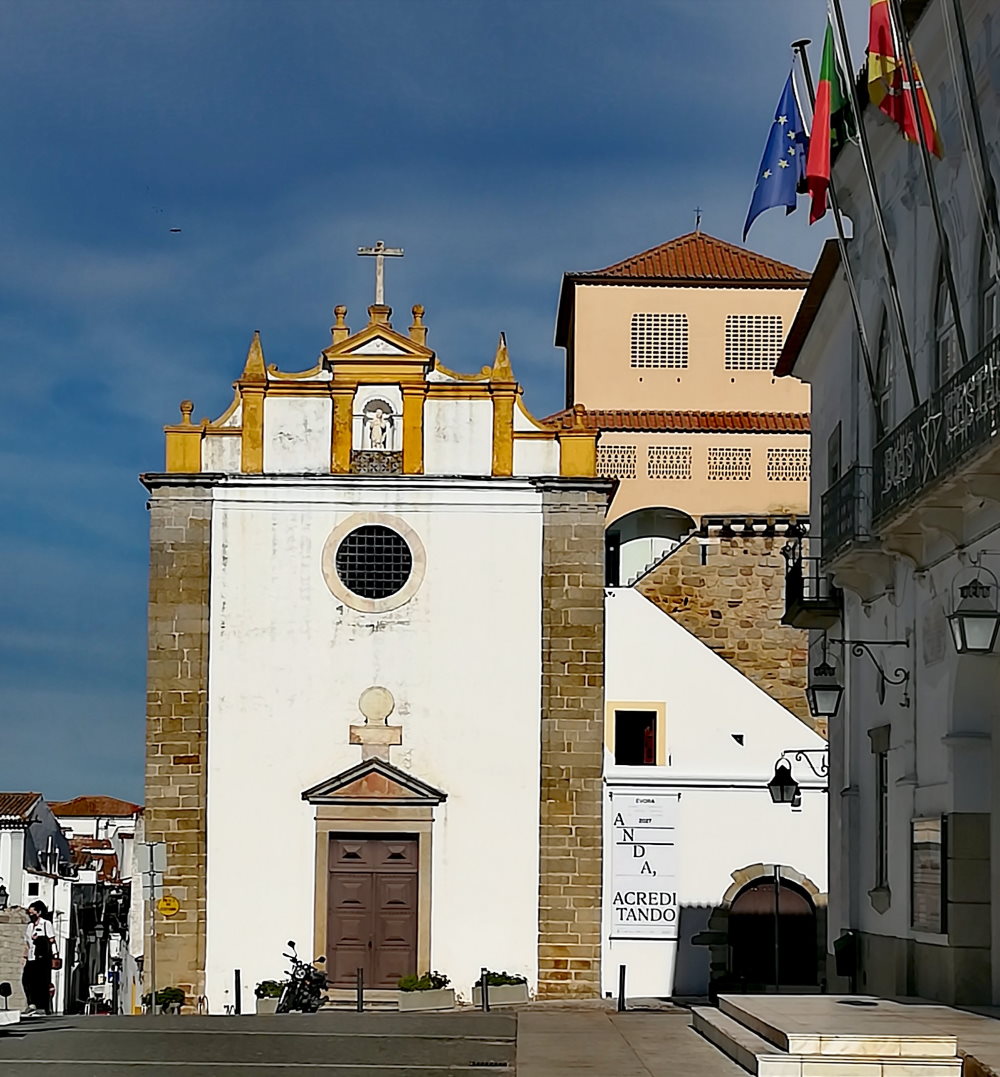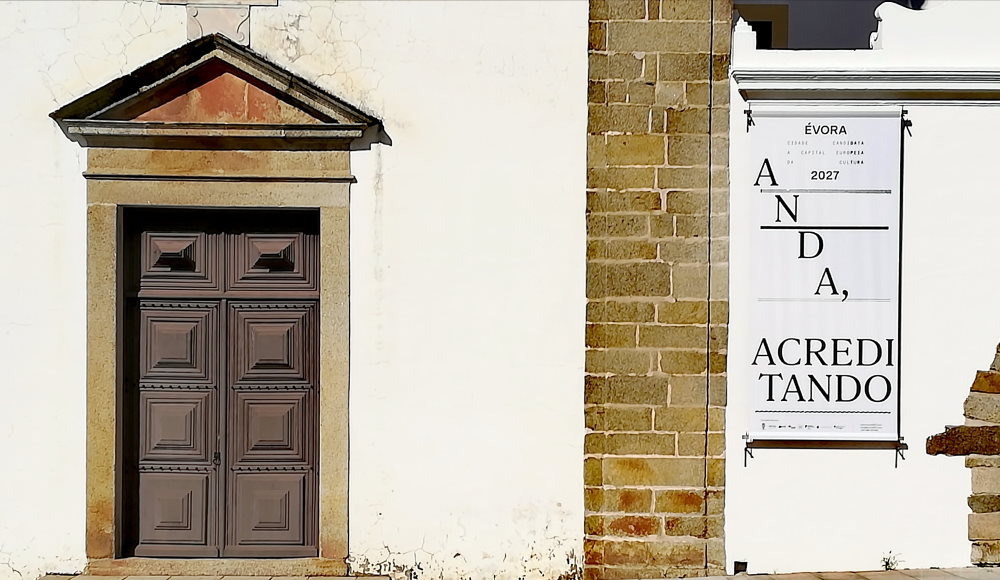Évora 2027: A participative project and commitment to the region
Évora’s candidacy for European Capital of Culture 2027 has just been presented at a press conference. During the session at the Torre do Salvador, in Évora, headquarters of the candidacy, Paula Mota Garcia (coordinator of the Mission Team) and Carlos Pinto de Sá (Mayor of Évora and representative of the Executive Committee "Évora 2027") have announced the project which focuses on the Alentejo’s cultural identity and provides for the design and implementation of long-term structuring actions, capable of safeguarding sustainable links between the cultural and creative sector and other areas of society.
The bidding process, which stems from the city's cultural strategy (Strategy 2030) to be presented by the Municipality of Évora by the end of the year, intends to value the territory, its people, its tangible and intangible heritage, and its contributions to the construction of national and European identity, choosing human scale in its relationship with different dimensions as the starting concept.
The creation of Évora 2027 narrative and concepts to be defended in the BidBook – the document in which the intention of a candidate city to the title of European Capital of Culture (ECOC) I formalised - was started by the Mission Team, coordinated by Paula Mota Garcia, in March 2020. The constitution of the Mission Team on that occasion was one more stage achieved by Évora's candidacy, which expressed its intention of being a candidate city for European Capital of Culture in November 2017, at the International Cultural Heritage Fair in Paris, having since then developed several preparatory works.
Such decision was the result of a political commitment of eight entities that make up the Executive Committee "Évora 2027": Évora City Council (leader of the candidacy, as required by European Regulations), Alentejo Regional Tourism Promotion Agency, Alentejo Regional Development Coordination Commission, Intermunicipal Community of Central Alentejo ( comprising the Municipalities of Alandroal, Arraiolos, Borba, Estremoz, Évora, Montemor-o-Novo, Mora, Mourão, Portel, Redondo, Reguengos de Monsaraz, Vendas Novas, Viana do Alentejo and Vila Viçosa), Alentejo Regional Directorate for Culture, Eugénio de Almeida Foundation, Alentejo Tourism and the University of Évora.
"Évora 2027 stands as a structuring project for the region's future where, taking into account natural differences, we must always seek what we have in common and, in particular, our love for the Alentejo", said Carlos Pinto de Sá, Mayor of Évora.
Over the last few months, and despite the intermittence caused by the pandemic context, an in-depth work has been developed to listen to the territory, to identify structuring partnerships at a regional, national and international level, to create conditions for bringing together artistic and research and innovation structures, to promote a meaningful dialogue with the artistic sector of the Municipality of Évora.
Taking into account that participation and commitment are some of the most relevant aspects of the current paradigm of European Capitals of Culture, over the next month Évora 2027 will launch a wide participative process based on a set of meetings in several municipalities of Central Alentejo and that will be coordinated by the University of Évora.
This presentation, which takes place during the adverse Covid-19 pandemic, reinforces the relevance of Évora's candidacy, which, according to Paula Mota Garcia, "has a strong responsibility in contributing to the relocation of measures to safeguard the Alentejo cultural and creative sector."
Starting at 6pm, the Évora 2027 project is presented in a public session in the former National Bus Station building in Évora. The event's programme also includes the show By Heart, a co-production of D. Maria II National Theatre, with text, direction and performance by Tiago Rodrigues (winner of the Pessoa Prize in 2019). In compliance with the directives of the Directorate-General of Health to safeguard the public and professionals, there is a set of health rules that will be strictly observed. Given the reduced capacity of the space, the event will also be broadcast online on the application's social media platforms, allowing the entire community to follow the whole event.
"Come, Believing"
This is the tagline chosen for the first phase of the candidacy, in which civil society is summoned to a broad process of participation in the construction of the strategy that will leverage the candidacy design. A tagline that puts word at the centre, valuing it as an expression of the territory’s cultural richness and as a promotion of linguistic diversity in the European context.
Orality is another highlight and a mark of Alentejo's cultural identity, as shown in the usage of the gerund. "Come,Believing" proposes the creation of a common voice, which rises from door to door until reaching a mobilising chorus that claims a collective design spreading in time and space. In line with the spirit of the candidacy itself, in which the path of construction is valued, the tagline will be evolving, as will the visual identity now presented, which has the signature of Lizá Defossez Ramalho and Artur Rebelo, from the communication design studio R2.
The European Capitals of Culture project
The European Capital of Culture (ECOC) programme is one of the European Union's flagship actions aimed at promoting a common cultural area. The ECOC are an opportunity to highlight the richness and diversity of European culture, as well as free and democratic access, celebrating shared cultural traits. They are a means of contributing, through the implementation of long-term strategies, to empower the cultural and creative sector, to act on the whole economic and social ecosystem, as well as to raise the international profile of cities awarded the title.
In 2027, the title of European Capital of Culture will be awarded to two cities, one in Portugal and one in Latvia. In November 2020, the Ministry of Culture is expected to publish a National Competition Notice, as established by the European Commission. The cities interested in applying will have about one year to formally respond through the presentation of a formal document (the ‘BidBook’) which will involve a reflection process on the role of culture in the city's development strategy. In mid-2022, the shortlist of cities will be published and they will be invited to detail their proposals according to a set of recommendations. The jury's final result will be known between late 2022 and early 2023.

